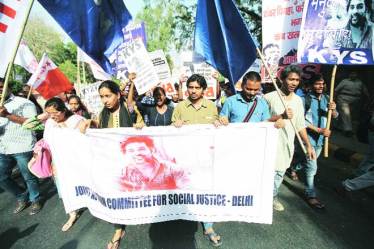IN A small village of Rajasthan, a Dalit man, Krishan Gopal, having been denied entry into a temple by upper-caste villagers, decided to himself build a temple for his beloved deity Hanuman. He pooled in his entire savings, borrowed a heavy amount from a local moneylender, purchased a big statue and even brought a Brahmin priest from UP to consecrate the idol. This devotion promptly ensured his socio-economic boycott by the villagers, forcing his family to migrate and find shelter on the streets of Jaipur. With the temple lying abandoned in his village, Gopal, a daily labourer, died on the streets of a metropolis.
On the threshold of its 70th year of independence, India is yet to fulfill the promises it had made to its underprivileged citizens on the night of its “tryst with destiny”. The failed promises have many faces, be it tribals of central Indian forests, victims of fake encounters and riots, or the homeless languishing on footpaths of metros. In his latest book, Fatal Accidents of Birth, veteran activist Harsh Mander recounts the stories of 17 such persons who faced the violence society inflicted upon them—violence, which was not always physical, but was often socio-psychological, and hence left scars that could not be easily identified, much less healed.
You May Also Want To Watch:
The book’s title is derived from Dalit youth Rohith Vemula’s suicide note: “My birth is my fatal accident.” The great Bengali author, Mahashweta Devi, believed that her writing was a ‘repentance’ for all the sins civilisation committed against the underprivileged. Mander’s work is an ‘atonement’ of the ‘memory’ of Vemula.
Mander raises the issues popular consciousness has ignored in its mad rage. One chapter is about the juvenile among the convicts of the 2012 Delhi rape case. His mother was married to a much older, violent man at the age of 13 years, and later, in abject penury, was forced to send her 11-year-old son to Delhi to earn a few pennies for the family of seven. An “uncaring, unequal world from which we derive our privilege” eventually transformed this young boy into an offender. “Should we not also recognize our culpability,” Mander asks, “in the violence we foster by our wealth, our unapologetic consumption and our indifference.” While society believed that justice required no less than capital punishment for the juvenile, Mander seeks another opportunity for him.
Yet, several of these “bleak, harrowing stories” falter. At many instances, the author merely rehashes information that is already in the public domain, culling out details from media accounts. Such accounts add little to our understanding of the issue. One knows more about Vemula or Ishrat Jahan than what the book offers. Jahan is perhaps the most prominent encounter victim of the past 10 years, the case often haunting both the Gujarat and the central governments. The author underlines having repeatedly met her family, but his account barely suggests so. A personal touch, which lends the stories of oppression an impenetrable force, is missing from several chapters.
Even if the book falters in narration at places, it never does in intention. The author creates a sensitive sketch of Dandapani aka Dhanam (a reproduction of his 2002 article published in Frontline), who was born a boy, but got his genitalia severed to be with the third gender community. Dhanam faced family and public ridicule since childhood, as he would dress up and behave like a girl. Society had no place for his sexual preferences. He left his family, became a sex worker, choosing men as his partners. His family, having learnt about his life, thrashed him, which eventually led him to opt for the surgery. An act that meant an “irreversible affirmation of one’s identity”, “infinitely more so than even a vow of marriage of priestly celibacy”. Did Dhanam ever regret the life she had chosen? She replied: “Who would want to be reborn a eunuch?” Trace the collective violence underneath this question, and you find a tormented nation.
Ashutosh Bharadwaj
